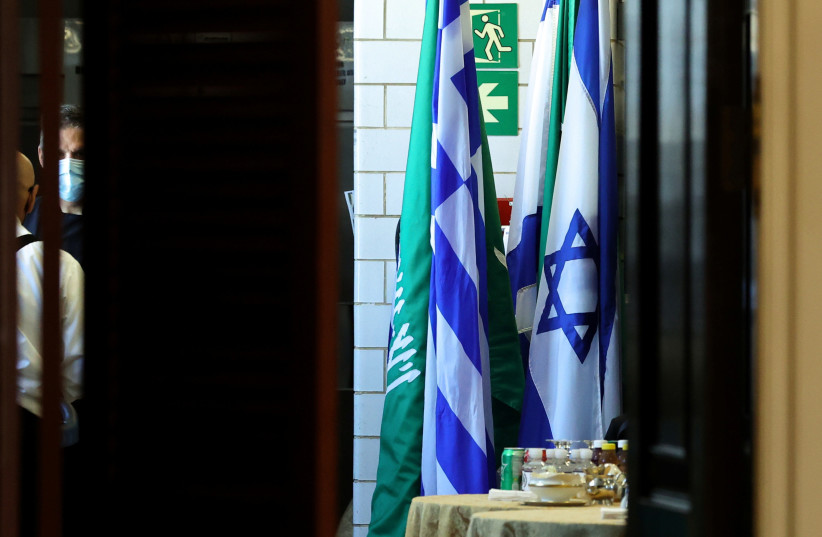Iran and Saudi Arabia appear to be headed to a new era of relations after rounds of talks in Baghdad and support for reconciliation coming from Oman and China. Reports that the two countries have now reconciled and agreed to normalize relations after years of hostility is important for the region. The news is being greeted positively in Iranian state media and the Gulf.
A big elephant in the room is Saudi Arabia’s potential ties with Israel. Reports at The Wall Street Journal and New York Times both indicated this past week that Riyadh has floated the prospect of ties with Israel in exchange for more US support for Riyadh.
What might happen now in relation to this potential game changer for the region? It’s not likely that Saudi Arabia was seeking to normalize ties with either Iran or Israel, instead it had pursued both tracks.
Iranian media has said that “the Zionists” are not pleased with the new Iran-Saudi ties. However, it’s not clear if these issues are linked. What is clear is that Saudi Arabia is seeking a new path in the region and globally.
Diplomacy not conflict
Turkey is doing the same. Ankara has been reconciling with countries it was hostile towards in the past, such as Israel and the Gulf. This means that in general the Middle East is now an arena of diplomacy, and not conflict. The Abraham Accords, Negev Forum, I2U2 (India, Israel UAE, US) and other groupings have made this clear.

That means that critics of the Iran-Saudi ties may not be seeing the forest for the trees. The forest is diplomacy. The trees are all the separate conflicts in the region. There are some critics who tend to be against the Saudi reconciliation but who have not been against Iran-Turkey ties. This makes no sense. Tehran and Ankara enjoy warm ties even though ostensibly they disagree on some issues. Moscow is now seeking to bring Turkey, Iran and the Syrian regime together.
There are also critics who see this agreement as evidence of the weakening US role in the region. These voices portray China as the rising regional leader.
This is a mistake. The US Defense Secretary and top US general Mark Milley were recently in the region. This shows that countries close to the US are seeing increasing attention from Washington.
China played a key role in hosting the talks and making this agreement happen. This comes after Beijing has sought to play a larger role in the Gulf. Beijing enjoys warm ties with Iran and also Saudi Arabia. Iran believes this will strengthen “stability” in the region. Iran, though, is one of the leaders of destabilizing countries in the region.
THE KEY ISSUE now will be to see if Iran shifts its behavior. Iran has sought to increase the power of Shi’ite militias in Iraq, and it has backed the Houthis in Yemen and it backs Hezbollah in Lebanon. The key story now is to examine whether the new deal between Riyadh and Tehran will lead to a deal for Lebanon’s presidency, which has been vacant.
It also may lead to reconciliation between Saudi Arabia and the Syrian regime. Syrian regime leader Bashar al-Assad was recently in Oman, and Damascus has warmed its ties with the UAE recently.
In addition, Iran has been sending weapons shipments to the Houthis, some of which were interdicted by US and UK naval ships. Will Iran now reduce support for the Houthis? Will Saudi Arabia end its intervention in Yemen, which began in 2015? Will Iran stop attacking commercial ships in the Gulf of Oman?
These are the major questions about how Iran’s behavior may need to shift following the agreement. If Iran doesn’t shift its behavior and if there is no deal in Yemen or Lebanon to reduce tensions then the agreement will appear hollow, or it will appear that it is only focusing on one “file” and not looking at the broader region.
Historically the region has always had its own internal relations and also in its relations with the great powers.
For instance, while Saudi Arabia or Pakistan were close to the US, Pakistan also historically worked with China. Some countries in the region historically worked closely with Russia, such as Egypt into the 1970s and Iraq into the 1980s. This means that it’s never either/or in terms of relations.
The US has a powerful legacy in the Middle East. Russia also does. While the US has signaled some form of retreat from the region and it repositions itself from the global war on terror to confronting near-peer adversaries like China and Russia, it would be a mistake to portray the Saudi-Iran ties as a loss for the US.
Saudi Arabia must make the right choices for itself and this doesn’t preclude having good ties with the West. Rather, it is voices in the West that have often tried to distance themselves from Riyadh. Whereas the US was close to Saudi Arabia in the 1980s and 1990s, there has been a rising chorus in the US against a close partnership with Riyadh.
Saudi Arabia can read those comments in the media and social media just as well as anyone else. It understands that there are many voices who want to distance Washington from Riyadh. Therefore, it has made its choices toward a more independent policy. It has made this judgment by watching Turkey and others carve their own path.
It remains to be seen if the new ties with Iran will actually bring change. In the past many countries tried a new tack with Tehran, such as the Iran deal of 2015, and Tehran didn’t change its behavior. This is because Iran’s regime is addicted to arming militias and hollowing out Iraq, Syria, Lebanon and Yemen. How will Iran change its policy after decades of doing one thing? That is a key question after the new ties were announced.
